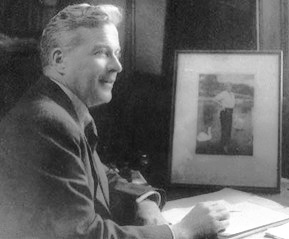Lionel Logue
Lionel George Logue (26 February 1880 – 12 April 1953) was an Australian speech therapist and elocutionist who gained worldwide prominence for his work with King George VI of the United Kingdom, helping him overcome a significant stammer. Logue's relationship with the King was famously depicted in the 2010 film The King's Speech, where Logue was portrayed by Geoffrey Rush.
Early Life[edit | edit source]
Lionel Logue was born in Adelaide, South Australia, to George Edward Logue, a brewer, and Lavinia Rankin. He was educated at Prince Alfred College and showed an early interest in the mechanics of speech, partly inspired by his own experiences with speech difficulties during his childhood. Despite lacking a formal university education in speech therapy or medicine, Logue was a self-taught practitioner who extensively studied voice production and speech disorders.
Career[edit | edit source]
In 1902, Logue started his career as an elocution teacher in Perth, Western Australia, where he developed innovative techniques for treating speech impediments. His methods were based on breathing exercises, relaxation techniques, and rhythmical speech patterns. Logue's reputation as a speech therapist grew, and he worked with many soldiers returning from World War I, who were suffering from shell shock and related speech issues.
In 1924, Logue moved to London, where he established a successful practice in Harley Street, a renowned medical district. His work in London expanded his clientele to include politicians, actors, and other public figures who sought his help for various speech and voice problems.
Work with King George VI[edit | edit source]
The most notable chapter of Logue's career began in 1926 when he was introduced to the Duke of York, later King George VI, who suffered from a severe stammer. The Duke had sought the help of many specialists without significant improvement before meeting Logue. Through a rigorous and unconventional treatment plan that emphasized psychological support alongside physical exercises, Logue was able to help the Duke significantly improve his speech.
Their work together was crucial in preparing the Duke for his unexpected ascension to the throne in 1936, following the abdication of his brother, King Edward VIII. Logue's support was particularly vital during the King's 1939 radio broadcast announcing Britain's entry into World War II, a speech that is considered one of the defining moments of George VI's reign.
Legacy[edit | edit source]
Lionel Logue's innovative approaches to speech therapy left a lasting impact on the field. His work with King George VI brought attention to the importance of speech therapy and the potential for individuals with speech impediments to overcome their challenges with the right support.
Logue passed away in London in 1953, but his legacy lives on through his contributions to speech therapy and his famous partnership with King George VI. The story of their friendship and professional collaboration was brought to life in The King's Speech, highlighting Logue's significant role in history.
See Also[edit | edit source]
Search WikiMD
Ad.Tired of being Overweight? Try W8MD's physician weight loss program.
Semaglutide (Ozempic / Wegovy and Tirzepatide (Mounjaro / Zepbound) available.
Advertise on WikiMD
|
WikiMD's Wellness Encyclopedia |
| Let Food Be Thy Medicine Medicine Thy Food - Hippocrates |
Translate this page: - East Asian
中文,
日本,
한국어,
South Asian
हिन्दी,
தமிழ்,
తెలుగు,
Urdu,
ಕನ್ನಡ,
Southeast Asian
Indonesian,
Vietnamese,
Thai,
မြန်မာဘာသာ,
বাংলা
European
español,
Deutsch,
français,
Greek,
português do Brasil,
polski,
română,
русский,
Nederlands,
norsk,
svenska,
suomi,
Italian
Middle Eastern & African
عربى,
Turkish,
Persian,
Hebrew,
Afrikaans,
isiZulu,
Kiswahili,
Other
Bulgarian,
Hungarian,
Czech,
Swedish,
മലയാളം,
मराठी,
ਪੰਜਾਬੀ,
ગુજરાતી,
Portuguese,
Ukrainian
Medical Disclaimer: WikiMD is not a substitute for professional medical advice. The information on WikiMD is provided as an information resource only, may be incorrect, outdated or misleading, and is not to be used or relied on for any diagnostic or treatment purposes. Please consult your health care provider before making any healthcare decisions or for guidance about a specific medical condition. WikiMD expressly disclaims responsibility, and shall have no liability, for any damages, loss, injury, or liability whatsoever suffered as a result of your reliance on the information contained in this site. By visiting this site you agree to the foregoing terms and conditions, which may from time to time be changed or supplemented by WikiMD. If you do not agree to the foregoing terms and conditions, you should not enter or use this site. See full disclaimer.
Credits:Most images are courtesy of Wikimedia commons, and templates Wikipedia, licensed under CC BY SA or similar.
Contributors: Prab R. Tumpati, MD


